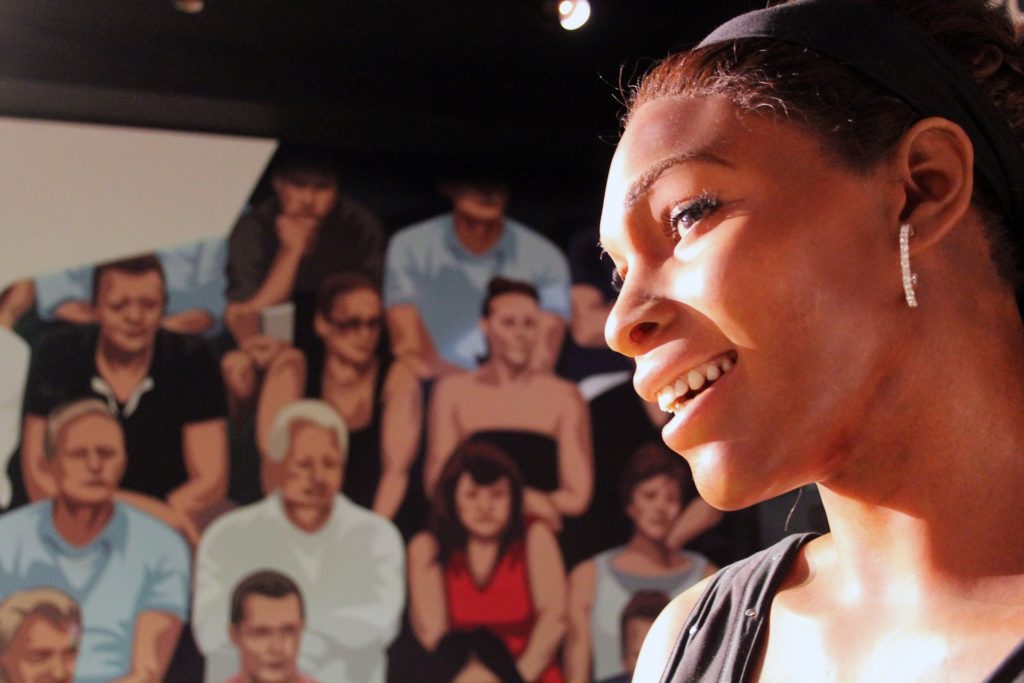- Calls to this hotline are currently being directed to Within Health, Fay or Eating Disorder Solutions
- Representatives are standing by 24/7 to help answer your questions
- All calls are confidential and HIPAA compliant
- There is no obligation or cost to call
- Eating Disorder Hope does not receive any commissions or fees dependent upon which provider you select
- Additional treatment providers are located on our directory or samhsa.gov
Serena Williams Addresses Body Image in a Letter to Her Mom

Serena Williams has long been an inspiration to women. For over 20 years, she has fought back against racism, sexism, and body-shamers while excelling at her craft on the tennis courts. Williams continued to inspire and speak on issues that matter when, after giving birth to her daughter, she wrote a thoughtful and touching tribute to her mother and the example she provided her [1].
Her Mother’s Legacy
In her letter, Williams addresses the numerous battles she has had to face “since she was a 15-year-old and even to this day [1],” taking issue with those that have shamed her for her body, discriminated against her due to her race, and have belittled her success by claiming she uses performance-enhancing drugs.
Williams does not indulge these negative voices in her letter. Instead, she simply and confidently refuses to pay them any mind, listing them off as quickly as she would list the trophies she has won. Williams makes it clear that the example set by her mother gave her the knowledge and the awareness to fight any ignorance and hatred thrown her way.
These are victories of a different kind, however, because Williams gained emotional and mental strength each time she overcame the comments of a “reporter, person, announcer and, quite frankly, hater, who was too ignorant to understand the power of a black woman [1].”
This letter shows the impact a woman can have when she loves her body for all that it is, unconditionally and unapologetically. Even more than that, it shows us the legacy a woman can create when she teaches her daughter to do the same.
The Challenge Every Parent Faces
Studies show that “peer influences, such as interpersonal pressure to be thin and criticism about appearance, correlate with body dissatisfaction and disordered eating among adolescent females [2].”

These days, adults and children, alike, are inundated with messages telling them that they aren’t good enough, aren’t thin enough, aren’t pretty enough. No matter what a person looks like, media and the beauty industry are continually sending the message that it isn’t enough.
However, research additionally supports the idea that having positive support at home is instrumental in combatting the onset of eating disorders [2].
This push-and-pull between the pressures of society and the support of family can be a daunting task for with which parents can deal. It is a constant battle to silence or dispute the false messages being pushed upon your child from the outside world.
Yet, Serena Williams’ letter is a beautiful example of the confidence and self-love that can arise when a child is told that, regardless of what the media and beauty industry would have them believe, they are loved unconditionally, their appearance says nothing about their worth, and they are enough.
Hope for the Next Generation
As Williams confidently asserts, “we (women) don’t all look the same. We are curvy, strong, muscular, tall, small, just to name a few, and all the same: we are women and proud [1].”
As a whole, Williams’ letter embodies hope. The hope that she can continue to fight society’s expectations of what she should look like, the hope that she can set the same beautiful example for her daughter, and the hope that, in doing so, our society will continue to change its limited ideals of beauty and worth.
 About the Author: Margot Rittenhouse is a therapist who is passionate about providing mental health support to all in need and has worked with clients with substance abuse issues, eating disorders, domestic violence victims and offenders, and severely mentally ill youth.
About the Author: Margot Rittenhouse is a therapist who is passionate about providing mental health support to all in need and has worked with clients with substance abuse issues, eating disorders, domestic violence victims and offenders, and severely mentally ill youth.
As a freelance writer for Eating Disorder and Addiction Hope and a mentor with MentorConnect, Margot is a passionate eating disorder advocate, committed to de-stigmatizing these illnesses while showing support for those struggling through mentoring, writing, and volunteering. Margot has a Master’s of Science in Clinical Mental Health Counseling from Johns Hopkins University.
References:
[1] Williams, S. (2017). Letter to my mom. Reddit. Retrieved on 26 September 2017 from https://www.reddit.com/user/serenawilliams/comments/714c1b/letter_to_my_mom/.[2] Linville, D. et al. (2012). Eating disorders and social support: perspectives of recovered individuals. Eating Disorders, 20: 216-231.
The opinions and views of our guest contributors are shared to provide a broad perspective of eating disorders. These are not necessarily the views of Eating Disorder Hope, but an effort to offer discussion of various issues by different concerned individuals.
We at Eating Disorder Hope understand that eating disorders result from a combination of environmental and genetic factors. If you or a loved one are suffering from an eating disorder, please know that there is hope for you, and seek immediate professional help.
Published on October 19, 2017.
Reviewed By: Jacquelyn Ekern, MS, LPC on October 19, 2017.
Published on EatingDisorderHope.com

The EatingDisorderHope.com editorial team comprises experienced writers, editors, and medical reviewers specializing in eating disorders, treatment, and mental and behavioral health.

